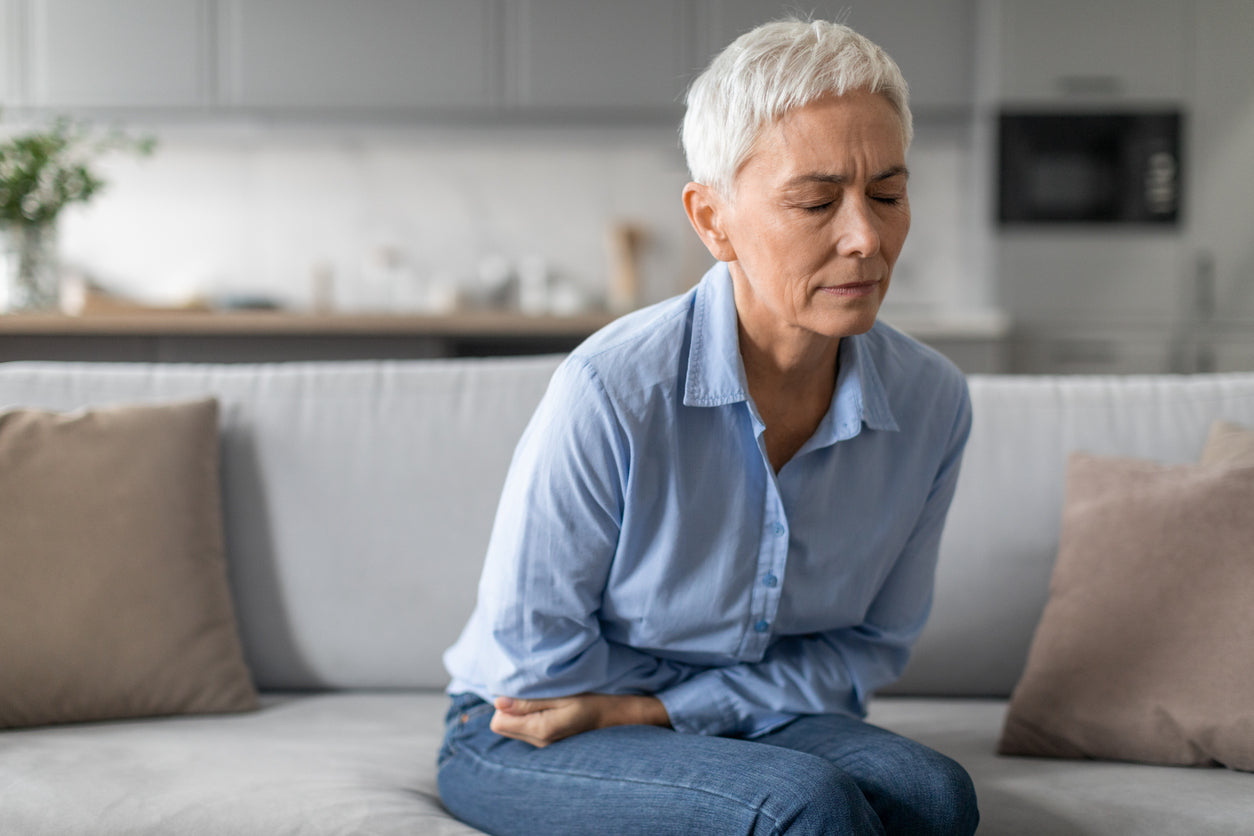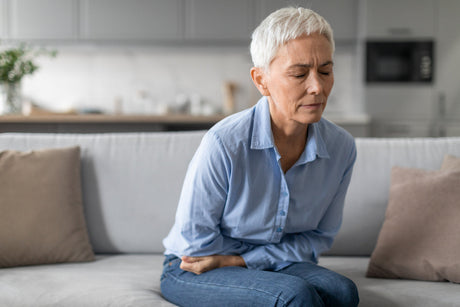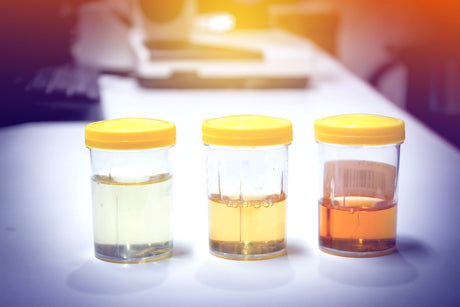We’ve all been there—you're ready to use the bathroom, but nothing happens. It can be frustrating, uncomfortable, and even a little scary. If you’ve ever found yourself asking, “What do I do if I can’t pee?”—you’re not alone! This problem is called urinary retention.
While occasional trouble urinating might not be a cause for alarm, it's important to listen to your body and keep track of your symptoms. Urine plays a key role in flushing out waste and keeping your system balanced, so when you suddenly can’t go, it’s worth paying attention. In this guide, we’ll walk through some of the most common causes of urinary retention, simple solutions you can try at home to help your bladder, and signs that it’s time to call a urologist.
Table of contents
Possible Causes of Urinary Retention: Understanding Why You Can’t Go
When you’re having trouble urinating, the first step is to try and understand why. Knowing what might cause urinary retention can help guide you toward the best solution—whether it’s a quick fix or a medical issue that needs attention. Let’s take a look at some of the most common culprits.

Physical Blockage: When Something’s in the Way
One possible cause of urinary retention (the inability to pee) is a physical blockage in the urinary tract (which includes your bladder and urethra). This can happen for a few reasons:
- Enlarged prostate: In men, an enlarged prostate, which can be malignant (prostate cancer) or non-cancerous (benign prostate hyperplasia or BPH), can press against the urethra and make it harder to urinate.
- Urethral stricture: A narrowing of the urethra (the tube that carries urine out of the body) due to scarring or injury can also block urine flow.
- Bladder stones or tumors: These can physically obstruct the bladder outlet, leading to increased urinary retention.
- Recent surgeries: Sometimes, procedures involving the pelvis, spine, or urinary tract can lead to temporary difficulty urinating.
If you've had surgery recently or know you have any issues with your urinary system, that could be part of the reason you're having trouble peeing.
Medical Conditions: UTIs, Kidney Stones, and More
Sometimes, underlying health issues can interfere with normal urination. Two of the most common medical conditions that can lead to urinary retention include:
- Urinary tract infections (UTIs): These can cause swelling and inflammation in the urethra that makes it harder to pee. If you’re feeling pressure, burning, or frequent urges to go with little result, a UTI might be the reason. If you're someone who is prone to UTIs, taking a daily UTI defense supplement can help prevent UTIs and promote ongoing urinary health.
- Kidney stones: These hard mineral deposits can block the urinary tract, preventing urine from flowing freely.
In some cases, nerve-related conditions like diabetes, multiple sclerosis, or spinal injuries can affect the signals between the brain and the bladder, making it harder to urinate even when the bladder is full.
If you or your family members have a history of kidney stones or neurological conditions, that could provide a clue to what's causing your urinary retention as well.
Medications: Side Effects You Might Not Expect
Believe it or not, some medications can interfere with your ability to pee. These may include:
- Antihistamines and decongestants
- Certain antidepressants
- Medications for high blood pressure
- Muscle relaxants
- Radiation therapy (particularly when directed at the pelvic region such as in treatment for prostate, bladder, or rectal cancer)
These drugs can affect the nerves and muscles involved in urination. If you’ve recently started or changed a medication, check the side effects and talk with your healthcare provider about whether this could be contributing to the problem.

Immediate Solutions for Urinary Retention: Gentle Ways to Get Things Flowing
If you're experiencing difficulty urinating but don’t yet feel pain or other severe symptoms, there are a few things you can try at home to help your body do what it’s meant to do.
1. Hydration: The Power of Water
It may sound simple, but drinking more water can help stimulate your bladder and encourage urination. Dehydration can actually make it harder to pee because there’s not enough fluid for your body to eliminate.
A few hydration tips:
- Sip water consistently instead of chugging it all at once.
- Avoid caffeine and alcohol—both are diuretics and can irritate the bladder while also dehydrating you.
2. Physical Techniques: Relax and Reset
Your body needs to be in a relaxed state to allow your bladder muscles to release. Try these gentle, non-invasive methods:
- Deep breathing or meditation: Reducing tension in your body can help the bladder do its job.
- Warm compresses: Placing a warm compress or heating pad on your lower abdomen can help relax the muscles around your bladder and make urination easier.
- Running water or warm bath: Hearing running water or sitting in a warm bath may trigger the urge to go.
If these strategies help you urinate and you feel relief afterward, it may just be a temporary episode. But if the problem keeps returning, it's a good idea to investigate further.
3. Consider Your Pelvic Floor Muscles
Sometimes difficulty urinating can be linked to how your pelvic floor muscles are working. These are the muscles that support your bladder and help you start and stop the flow of urine.
If they’re too tight—or if you're holding tension in that area—it might be harder to relax enough to pee. This can happen during times of stress, after surgery, or due to certain muscle imbalances.
A few tips that might help:
- Try pelvic floor relaxation exercises, like gently exhaling and imagining your pelvic muscles "melting" downward.
- Avoid bearing down or pushing to force urination, which can strain the pelvic floor and bladder muscles and make things worse.
- If the issue continues, consider seeing a pelvic floor physical therapist, who can help assess your muscles and offer gentle exercises to restore balance.
Your pelvic floor works closely with your bladder, so treating it with care can make a real difference.

Understanding Acute Urinary Retention (When You Suddenly Can’t Pee at All)
In some cases, the inability to pee isn’t just uncomfortable—it can be a medical emergency. This is called acute urinary retention. It means your bladder is full, but you physically can’t urinate at all. It usually comes on suddenly and causes a lot of discomfort or pain in your lower belly.
If this happens, don’t wait it out. Go to the emergency room or call your doctor right away. You may need a catheter to relieve the pressure and avoid bladder damage or infection.
Acute urinary retention can be caused by things like an enlarged prostate (BPH), a blocked urethra, certain medications, or nerve issues. No matter the cause, it’s not something to ignore.
When to Seek Professional Help With Urinary Retention
If you’ve tried the strategies above and still haven’t been able to urinate, or if you're experiencing pain, it’s time to call a healthcare provider. Urinary retention can become a serious issue if left untreated.
If your urinary retention and inability to pee persists for more than a few hours—or if it keeps happening—it’s important to talk to a healthcare provider. They may do a quick physical exam, take a urine sample, or order imaging tests to see what’s going on.
You may be referred to a urologist, a doctor who specializes in urinary health, especially if the cause is something like an enlarged prostate (BPH) or bladder stones.
Early intervention can prevent complications like bladder damage or infections, so don’t wait too long if something feels off.
Symptoms That Shouldn’t Be Ignored
Pay close attention to any of the following symptoms that can indicate a more serious issue:
- Pain or pressure in your lower abdomen
- Swelling or bloating around your bladder area
- Visible blood in your urine
- Fever or chills (which can be a sign of infection)
- Vomiting or feeling very ill
These symptoms could point to an emergency, like a completely blocked bladder or a severe infection. In these cases, it’s best to go to the emergency room to get professional help diagnosing and treating your urinary retention.
A Quick Recap: What You Can Do to Address Urinary Retention
Here’s a summary of steps to take if you’re having trouble urinating:
- Stay calm and hydrated. Give your bladder time and encourage flow by relaxing and using gentle techniques.
- Think through recent changes. Consider your medications, any recent illnesses, or medical procedures that might be affecting your system.
- Watch for warning signs. If you’re in pain, feeling feverish, or haven’t peed in several hours, it’s time to reach out to a doctor.
You know your body best—so trust your instincts and don’t hesitate to ask for help. Urinary retention is more common than you might think, and the good news is, most causes can be managed or treated with the right care.
Frequently Asked Questions:
Does an enlarged prostate cause urinary retention?
Yes, an enlarged prostate—also known as benign prostatic hyperplasia (BPH)—can cause urinary retention. As the prostate enlarges, it can compress the urethra and obstruct the flow of urine from the bladder. This obstruction can lead to incomplete bladder emptying or, in severe cases, complete urinary retention.
I feel like I have to pee, but I can't. Do I have a urinary tract infection?
Feeling the urge to urinate without being able to pass urine can be a symptom of a urinary tract infection (UTI), but it can also result from other conditions like urinary retention or an enlarged prostate. UTIs often come with additional symptoms such as burning during urination, pain around the urethra, cloudy urine, or lower abdominal pain. It's important to see a healthcare provider for proper diagnosis and treatment.
Why does my urine flow stop and start?
A stop-and-start urine flow, known as intermittency, is often caused by an obstruction or weakened bladder muscles. Common causes include an enlarged prostate in men, urinary tract infections, or bladder dysfunction. This symptom should be evaluated by a healthcare provider to determine the underlying cause and appropriate treatment.
Do kidney stones cause urinary retention?
Yes, kidney stones can cause urinary retention if they obstruct the flow of urine, particularly when they pass into the ureter or block the bladder outlet or urethra. This blockage prevents urine from draining through the urethra properly and may lead to pain, urgency, or complete inability to urinate. Prompt medical attention is often required to relieve the obstruction and prevent complications.
Can bladder cancer cause urinary retention?
Yes, bladder cancer can cause urinary retention, particularly if a tumor obstructs the bladder neck or urethra. This blockage can interfere with normal urine flow, leading to difficulty starting urination, weak stream, or complete retention. Advanced tumors may also affect bladder muscle function, further contributing to retention.
Can I have urinary retention if I also experience urine leaks?
Yes, it is possible to have urinary retention and still experience urine leaks, a condition known as overflow incontinence. When the bladder cannot empty fully, it may become overly full, leading to involuntary leakage of small amounts of urine. This combination of retention and leakage often indicates a chronic bladder emptying issue that requires medical evaluation.
Sources
MedlinePlus. (2022). Urinary retention. U.S. National Library of Medicine. https://medlineplus.gov/ency/article/003145.htm
National Institute of Diabetes and Digestive and Kidney Diseases. (2019). Urinary retention. https://www.niddk.nih.gov/health-information/urologic-diseases/urinary-retention
U.S. Department of Health and Human Services. (n.d.). Urinary problems in older adults. National Institute on Aging. https://www.nia.nih.gov/health/urinary-problems-older-adults













